A guide to employee rights in the UK, which gives an overview of all the rights employees have, including general rights, protections, benefits and job security. It's an employer's responsibility to adhere to them, in order to be compliant.
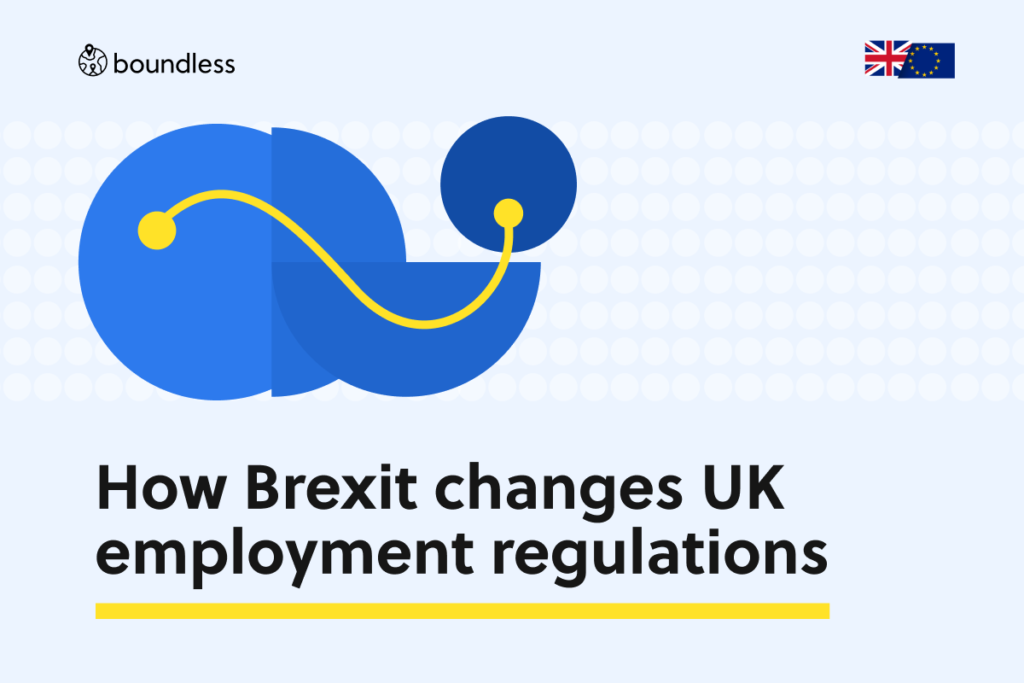
It’s been a few months since the UK officially exited the EU. While many aspects of the Brexit deal are better understood now, we have a way to go to grasp the details thoroughly. One crucial topic to many companies with UK-based employees or those employing UK nationals abroad is how Brexit impacts employment.
The good news is that while immigration and work permits for EU citizens are changing more significantly, UK employment law, which up until 31 December 2020 was based mainly on EU employment law, won’t be changing much in the foreseeable future. That stems from the fact that a fundamental condition to signing a free-from-tariffs-and-quotas Trade Deal between the UK and the EU was a promise by each to keep a level playing field regarding employment and tax policies, among others.
That said, here are some of the more pressing questions in terms of Brexit’s impact on employment.
Employment law doesn’t prevent UK citizens from being employed by companies that aren’t incorporated in the UK. However, these companies would still need to register with Her Majesty’s Revenue and Customs (“HMRC”) for their UK payroll and have employer’s liability insurance to cover their UK staff. They will also need a sponsorship licence from the Home Office and, in the case of intra-company transfer (ICT) visa route, will have to meet job suitability and minimum salary requirements. This is one of the two main “work” visa pathways alongside the “skilled” worker route. Applicants must be paid at least £41,500pa or the “going rate” for their occupation, whichever is higher. This is higher than the salary requirement under the “points based” skilled worker visa, where the tradeable salary threshold has been lowered to £26,500 or the going rate for the occupation, whichever is higher, with the further possibility of trading a lower salary against other criteria.
However, applicants may be reluctant to join a company that doesn’t have a presence in the UK. While establishing a company is one way of solving this problem, working with an Employer of Record such as Boundless is another. Boundless owns a Professional Employer Organisation in the UK, which acts as the legal employer, handling taxes, payroll, benefits, and many other aspects of employment compliance.
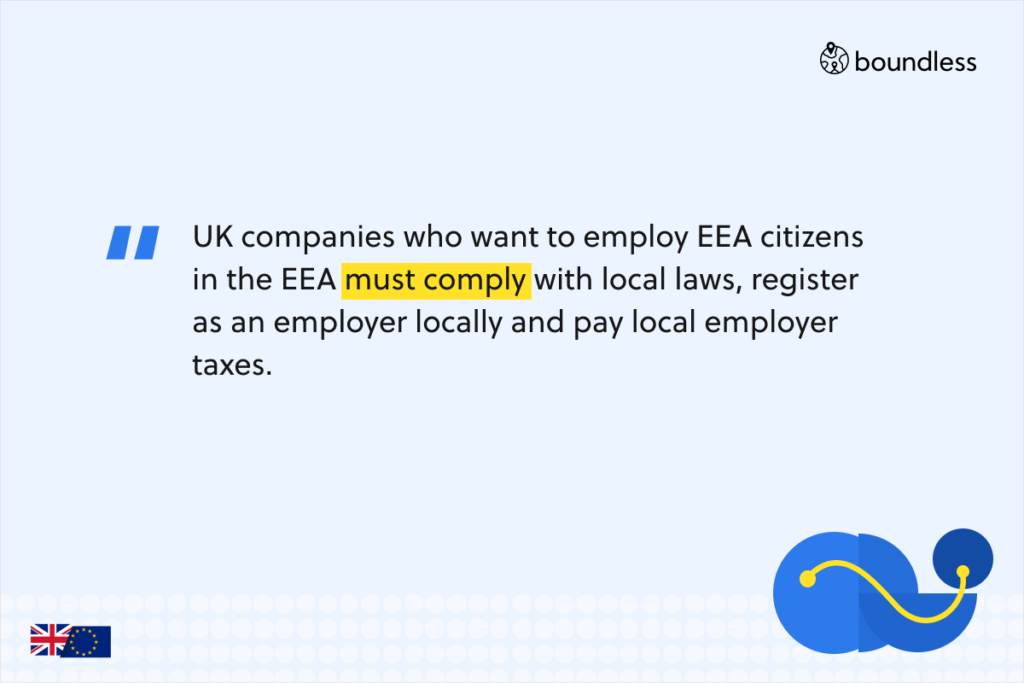
The position here is essentially the same as before: UK companies who want to employ EEA citizens in the EEA must comply with the relevant country’s laws. This often means, at minimum, registering as an employer locally and paying local employer taxes; however, establishing an entity could also be required. As mentioned above, an alternative to going through the motions of establishing a presence in a new country, which is far more complex and cumbersome than you may assume, is working with an Employer of Record. Currently, Boundless is operating a Global Professional Employer Organisation with fully owned infrastructure in eight EU countries (Denmark, Estonia, France, Germany, Ireland, the Netherlands, Poland, Portugal) and five non-EU countries (Australia, Canada, New Zealand, Singapore, the UK), with many more coming soon.
Brexit puts new obligations on UK companies who want to place UK citizens in an EEA location, as both freedom of movement and the Posted Worker Directive no longer apply to UK citizens since 31 December 2020. This means that UK employers need to comply with local immigration and employment law requirements to employ UK citizens in the EEA.
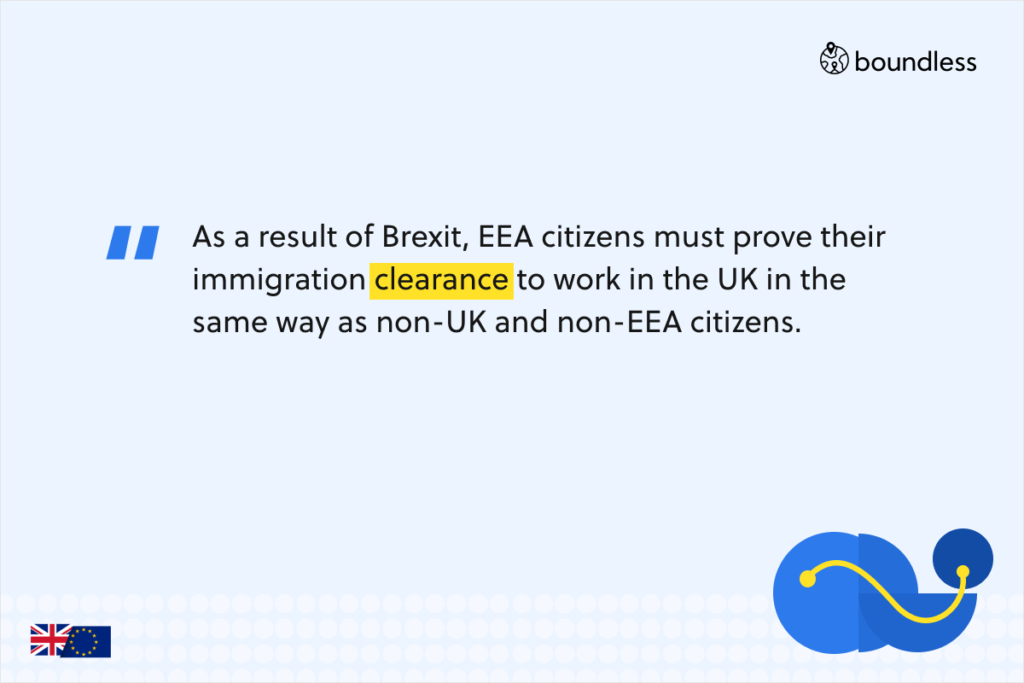
These companies can employ a UK citizen so long as they are registered with HMRC for their UK payroll and have employer liability insurance in place. As a result of Brexit, EEA citizens must prove their immigration clearance to work in the UK in the same way as non-UK and non-EEA citizens. Employers must perform right to work checks on all applicants. This can be done remotely using an online platform for some, but not all, applicants.
If these companies want to bring an EEA or non-EEA citizen into the UK for employment there, they will need to consider immigration clearance. They will usually need to obtain a sponsorship licence from the Home Office.
Any employment in the UK will be subject to UK employment law. To understand UK employment law and regulations around taxes, benefits, remote work, leave, end of employment, and others, check out the Boundless UK country guide.
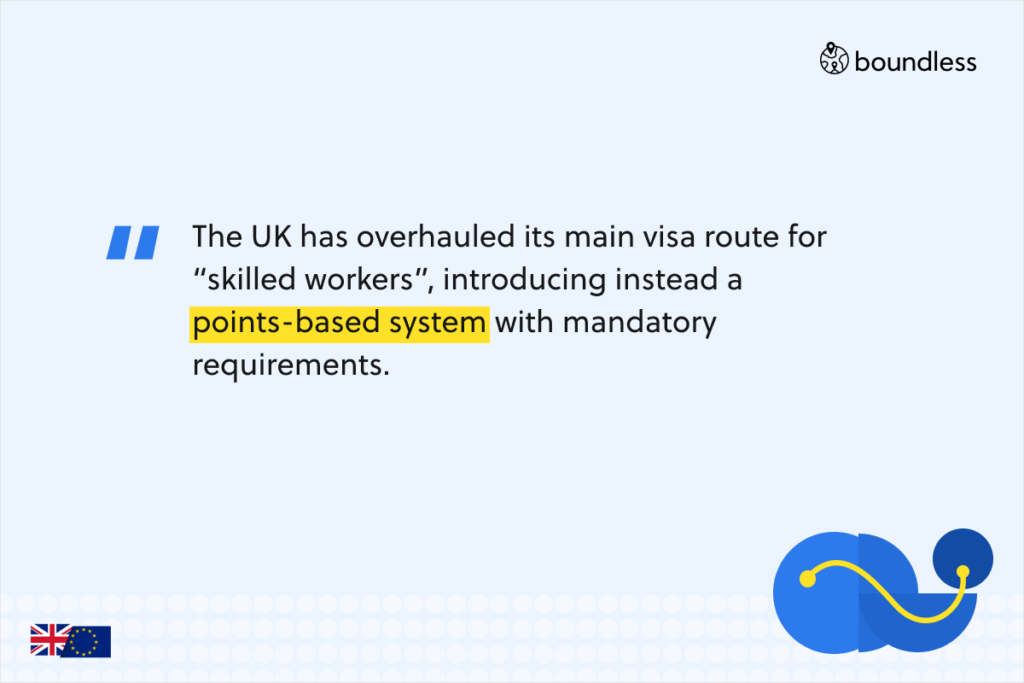
The Brexit implementation period ended on 31 December 2020. As of 1 January 2021, EEA citizens must prove their immigration clearance to move to the UK for work. This brings them in line with the existing position for non-EEA citizens. Generally, this means that they need a visa to live and work in the UK. This will usually mean obtaining a certificate of sponsorship from their prospective employer as part of their visa application unless they already have permission under a family or other visa.
EEA citizens living in the UK since before 31 December 2020 can apply for settled or pre-settled status.
The UK has also overhauled its main visa route for “skilled workers”, introducing a points-based system. This includes mandatory requirements on job skill level and speaking English. The primary outcome for EEA citizens is that coming to the UK for “unskilled” work has become more challenging.
Irish citizens can still live and work in the UK without restriction under the Common Travel Area arrangement, which hasn’t been affected by Brexit.
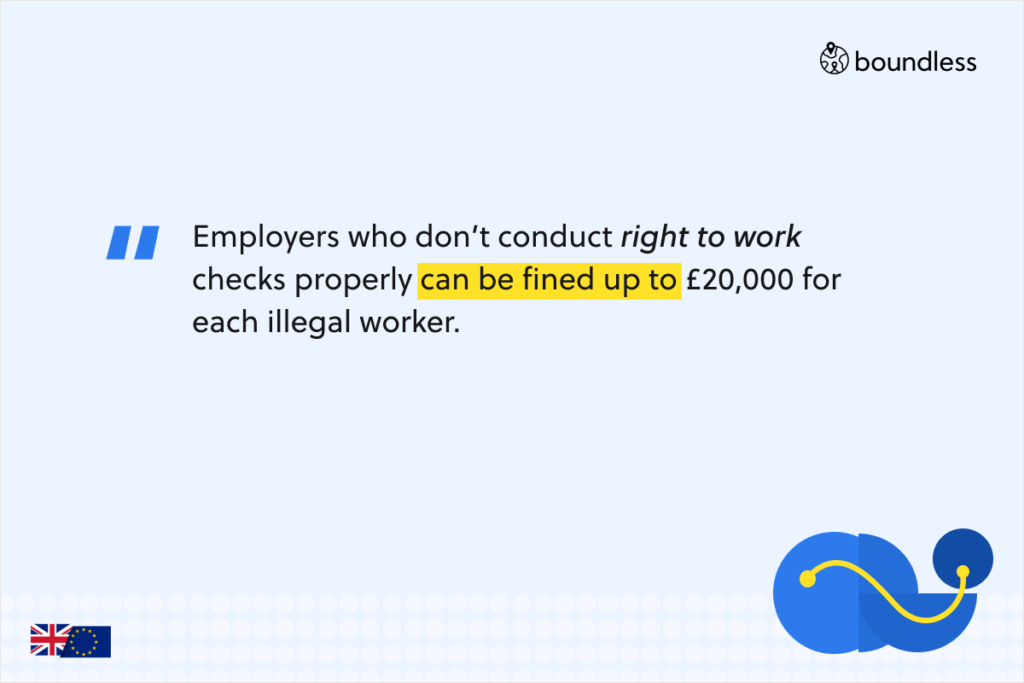
All employers have a statutory obligation to conduct right to work checks before employing an applicant in the UK. This means that employers must (1) establish an applicant’s UK citizenship or visa status during the application process and (2) monitor any changes during employment.
Employers who don’t conduct right to work checks properly can be fined up to £20,000 for each illegal worker. An individual who employs an illegal worker in the knowledge that they don’t have the right to work in the UK has committed a criminal offence, which can lead to imprisonment for up to five years and an unlimited fine.
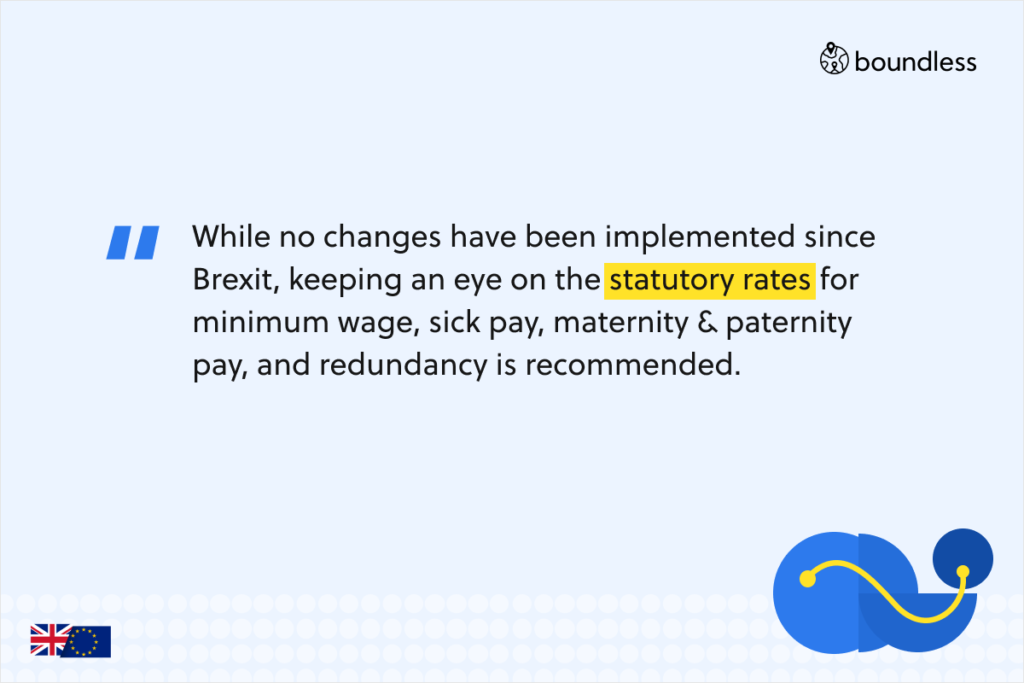
When the UK was in the EU, it implemented EU employment laws by passing domestic legislation in Parliament or the Northern Irish Assembly. This legislation is still on the statute books now that the UK has left the EU. However, unless it agrees otherwise, the UK won’t be bound to introduce any future EU employment laws, meaning that the UK and the EU could diverge.
While the UK could theoretically depart from EU employment standards, this is unlikely for two main reasons. Firstly, the UK’s employment standards are generally higher than EU minimums and reductions would be unpopular within the UK. Secondly, it could contravene the UK’s agreement to maintain a “level playing field” with the EU for worker’s rights under the Free Trade Agreement. In the longer term, the UK might make changes to certain EU derived laws which have been particularly impractical or unpopular with employers, in particular the Transfer of Undertakings (Protection of Employment) Regulations.
Given the COVID-19 pandemic and Brexit upheaval, major changes to employment law are unlikely in 2021. However, all UK employers should keep up to date with changes to the statutory rates for minimum wage, sick pay, maternity and paternity pay, and redundancy. One significant change (which was delayed by the pandemic last year and came into force on 6 April 2021) is the extension of the off-payroll working (“IR35”) rules to medium and large private-sector employers.
Otherwise, employment law continues to evolve through major court decisions, and employers should be mindful of the recent Supreme Court decision in the Uber case and look out for an eventual decision in the Agnew holiday pay case. Finally, Parliament is expected to consider new employment legislation in 2021, which may cover contract terms and leave for carers, and enhance pregnant employees’ redundancy rights.
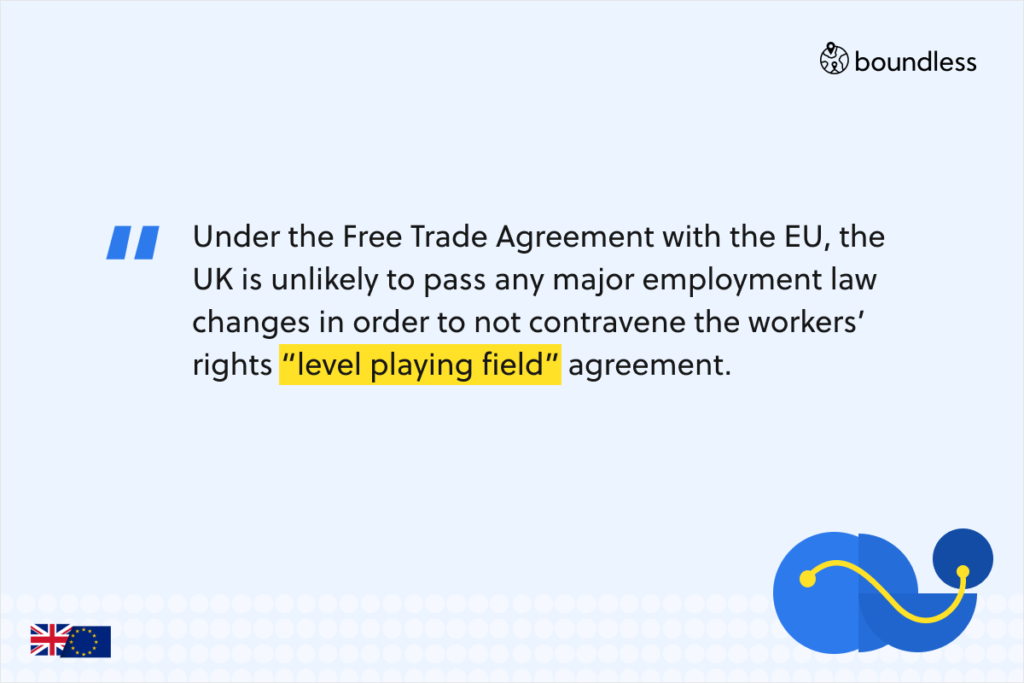
We hope this article has helped you with some of the questions you may have regarding UK employment post-Brexit. While the expectation is that nothing will change drastically immediately, you will have to keep an eye on new rules and regulations continuously. Alternatively, working with an Employer of Record in the UK may be worth your consideration. Boundless owns and operates a Global Professional Employer Organisation that supports the UK by having a fully owned infrastructure. (Read to learn why this is important and what else you should be looking for in an Employer of Record). Through the Employer of Record model, Boundless acts as the legal employer of local employees, staying on top of all new rules and regulations on your behalf.
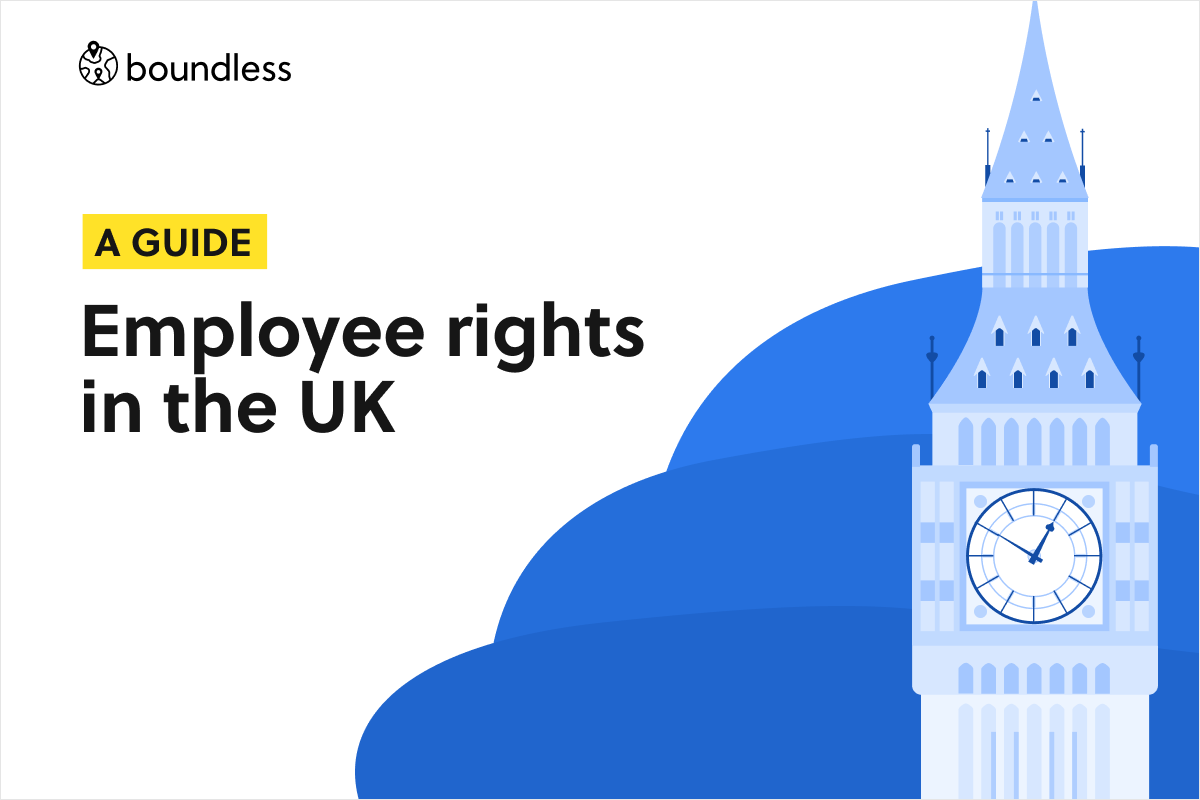
A guide to employee rights in the UK, which gives an overview of all the rights employees have, including general rights, protections, benefits and job security. It's an employer's responsibility to adhere to them, in order to be compliant.

Hello! We’re Boundless, and we make it easy to employ anyone, anywhere! Boundless makes it possible to get up and running quickly, with less effort, for less cost.

All over the world, Covid-19 has led to what's been dubbed the Great Resignation: millions of people, from frontline workers to senior executives, voluntarily calling time on their jobs. Is location-independent work the antidote?

Considering employing someone in New Zealand? Here is a guide to employee rights in New Zealand to help you understand what you need to comply with. A key topic is the set of local employee rights a worker residing in New Zealand is entitled to.

Considering employing someone in Croatia? To do that compliantly, an employer has a lot of obligations they have to fulfil. One comprehensive and important topic is the set of local employee rights a worker residing in Croatia is entitled to.

There is no easy answer to figuring out what benefits UK employers should be offering. It will depend on what is important to you, what your budget is, and what matters to your people. Having the answers to all of these questions, you will be in a better position to find the right solution for you.